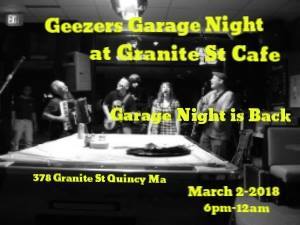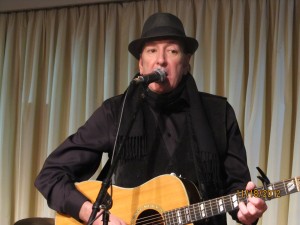
Singer-songwriter Marty Nestor has had a storied career in the greater-Boston/New England music scene. Aside from racking up awards and nominations from the Boston Music Awards and other, Nestor’s previous bands played many of the popular nightspots in the 1970s and 1980s. His latest album, Saint of the Highway, showcases the culmination of the hard work Nestor has aspired to over the years.
“The goal is always the same,” Nestor said, ‘try to come up with the best possibly ideas and put them on tape. That’s why it takes a long time to develop ideas. I’m also concerned with my style and the stories that I write about and they take time.”
Nestor’s latest creation Saint Of The Highway is selling well at his live shows as well as on CDBaby.com and Reverbnation.com. New England music fans who have followed Nestor’s career since the beginning are not surprised that he continues to impress with his songs and sounds. It’s been a long journey of hard work and trial and error for the Central Massachusetts singer-songwriter.
Nestor actually began his musical journey playing at a Catholic Folk Mass at St Anne’s Church in Littleton. He had a friend that was a priest in Littleton who had taught him how to box when he was around 10 or 11. Nestor became close friends with his priest
.
“I went to see him at the parish a few times and he played guitar,” Nestor recounted. “He would listen to Harrison’s ‘All things must pass’ after the Beatles broke up and came up with an idea of putting a folk mass together. He inspired me on many levels. My mother bought me my first guitar and every week I went to the parish and he taught me how to play.”
Nestor would practice long and hard for weeks on end with a little choir. After his priest left the parish, Nestor carried on the folk mass for another two years. “It was a big commitment at that age. Every Saturday afternoon at five o’clock I had to be there to play the Mass,” Nestor said.
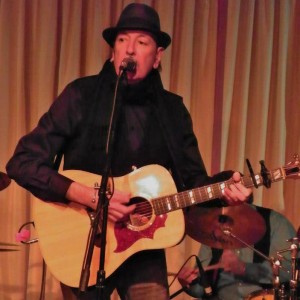
Eventually, Nestor made his way into the Central Massachusetts club scene, befriending a few people that played. He and his friends put a little garage band together that they called Raw Power when he was a high school sophomore.
“We’d practice in my mothers basement,“ Nestor said. “This band was a cover band, playing Stones, Iggy Pop, Kinks, Bowie, Sabbath and some originals. Hell, we even had a manager.
We played dances, and activity centers, parties and eventually barrooms. At first, we’d have to stay in the dinning area because we couldn’t drink. Then things changed when we became 18. The drinking age was 18 back then. We were a rebellious bunch.”
Bob Dylan, Jimi Hendrix, The Beatles, The Kinks, Tom Petty, Bruce Springsteen, and The Band were all influences. “I’ve learn from listening to them for years, writing style, the way certain writers have a pattern they follow. Where is the bridge, what is a bridge? What is a chorus? What is a 9th? How many verses do you use to tell your story? These are the guys that taught me how to do that,” Nestor said.
Although Nestor has many influences, he is largely a self-taught musician. “I’ve learned a lot from older, more talented people and put that to good use. My god given talent is my voice. Its taken years to evolve,” he said.
Early in his career, Nestor played with a band called Striders Wrath. He wrote an original set for the band. He and his band mates had recorded it onto cassette tapes and used them for promo. This is the time when the scrappy kid from Littleton started to see his own potential for songwriting coming at him like a tall ship on the horizon. The young man would soon earn the chore of honing all the God-given talent he had been blessed with. The boy had become a man. The performer had become an artist. Marty Nestor had truly found himself.
“That’s when I got serious about writing,” he said. “Then I realized, I didn’t want to play clubs every weekend and play cover tunes. Remember, it was a different circuit than the one in Boston.” This is the time Nestor discovered that Boston was home to an originals rock scene whereas the rural suburbs were home to cover rooms for people to dance to music they already knew.
“Boston had all these really cool original acts, punk was pretty big,” Nestor said. “But those (gigs) were playing for 50 dollars a night, and we were happy with that. I wanted to find the real money.
But covers were not my cup of tea anymore; had to write a hit or die trying.”
Striders Wrath had worked hard, practicing three nights a week for two years before they played out. The band became hugely popular, playing Mr. C’s Rock Palace and The Frolics. “For some reason some of the guys from Aerosmith, Boston, The Cars would come out and see our shows. It was more than a coincidence.”
Nestor is not sure why his band grew so popular so quickly, but he knew they were different. “It was not a usual cover band playing top 40 songs,” Nestor said. “We had theatrics and art thrown in, like the Tubes and early Fools. We played a Tull set people use to rave about. Self promotion was stick up a few posters and be done with it. It was all word of month and people just loved us. People came to see this band play with an original style. Striders finally ended, I just wanted more.”
From there, Nestor moved onto a band called Side One, a studio project and completely original band that played some gigs and a few showcases. “We got together and started rehearsing, and I started to write,” Nestor said. “It really was just another hard rock band out of many at that time. They were all very, very good musicians. It gave me a vehicle. I wrote most of the originals for that band.”
At the time Nestor and his band mates recorded a bunch of demo’s at Db recording in an old meat packing building in Fitchburg. “We then wanted to take it further. We looked for a good producer and up popped Hirsch Gardner. He had just got out of (a 1980s originals band called) New England and was playing with the Wild Bunch with Mach Bell around 85 to 86.”
“He help us rewrite a few songs,” Nestor continued, “and went down to Normandy sound in Rhode Island and recorded a serious demo, with Tom Soares engineering. The studio was owned by Phil Green. There was a lot of record interest at the time. We had the most with Manhattan Records. Hirsch worked with us on the demo that eventually went to Manhattan. Hirsch had worked with Todd Rundgren and knew his stuff. Hirsch taught me a lot about songwriting and where to place the hooks.”
Talk about ambitious and hard working, Nestor simultaneously played with a covers-originals hybrid called The Harms. “It was lead by Paul Olsen, and Booby Edwards of Thundertrain played drums,” Nestor said. “I played guitar and it was fun. We opened for a bunch of local acts back in the day in places like the Cinema Lounge, Mohawk Club, Bunrattys.”
The Harms played at the Cannes Music Festival in France, but that popular event didn’t further Nestor’s or the band’s career. “We where represented by a company that brought our songs to the convention,“ Nestor said. “Nothing really came of it. We had a backer at the time, and there was a lot of money being thrown around. We kind of got fucked on that deal, or not represented enough.”
Getting over his France experience, the guitarist-singer-songwriter played out in the Lowell area for a brief time with a fun cover band named Down Twisted. Things were about to change for the budding songwriter. Eventually, Nestor caught the acoustic singer-songwriter buzz. He formed NSL, an acronym for Nestor, Scott, and Lindy, as in Robb Scott and Matt Lindi.
“Playing with NSL brought me back to the acoustic aspect of playing without a lot of loud electric guitars and drums,” Nestor said. “I became comfortable, but at first it was an adjustment. Matt Lindi was a good friend and could play the shit out of an acoustic. He needed discipline, which I think I brought to the table. So we just kind of got together, and Robb was another very good lead acoustic player. The harmony work was pretty good, so we just starting getting together and playing small rooms. We played for about three years together.”
Nestor’s singer-songwriter aspect developed mostly during his experience with NSL. That acoustic material brought him back to his interest in Bob Dylan and songs with storylines.
A new baby daughter sidelined Nestor for three years, and being out of the business for a brief spell forced him to appreciate it even more. “I was away for about 3 years. But my daughter meant everything to me and I wanted to put as much time as I could with her at a young age, a very satisfying experience,” the songwriter said.
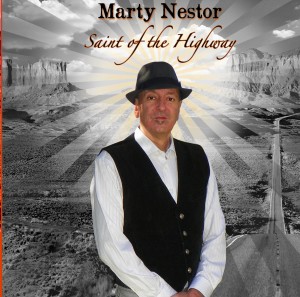
“Saint Of The Highway” is Nestor’s third album with his current band. His first solo album was essentially a demo with four songs on it. The biggest impetus to Nestor’s mid-life rise is his bassist/producer engineer, Jeff Root. Root owns The Root Cellar recording studio where he and Nestor have worked successfully on Nestor’s songs for almost a decade now.
“Jeff is a very talented songwriter, musician, producer, and friend,” Nestor said. “He has nine solo CD’s to his credit. He and I just hit it off. He’s a Godsend, a sounding board for my music. Now I’m always bouncing things off of him as before I use to try to do everything on my own. He kind of reels me in at times, a true collaboration of the mind and soul.”
With some help from his musician friends, Nestor, after years of hard work and experimentation, has gone from full blown rock singer to singer-songwriter.
“I have found myself,” Nestor said. “I think I’ve come into my own and know where I want to go as a songwriter. Now I have a much better understanding of who I am, and it took me a long time to understand that.”
Nestor’s current band includes his Strider’s Wrath lead guitar player Doug Vennard. Nestor and Vennard are great friends, and Nestor has admired his guitar talents for years.
“He is truly blessed and evolved his style into many styles, one of the best regional guitar players I’ve seen or worked with,” Nestor exclaimed. “He can play rock, roots, alt. country, blues. He plays in a few cover bands also and tends to reach in and pull the best out of you. You name it, he’s got it in his bag.”
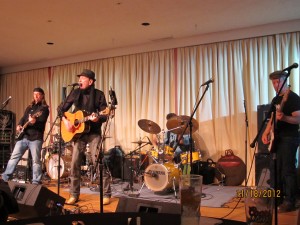
“Doug has matured as an original and his ideas are brighter and I trust him,” Nestor continued. “Big word right there. He has a heart of gold, as does Jeff. Half the writers in Central Mass need to tip their hats to Jeff. He’s helped so many find their direction. Some people are very selfless when it comes to their art.”
Nestor‘s drummer, Kim Miller, has been a friend and fellow player since Nestor was 14 years old. Again, it’s the combination of friendship and talent that allowed the bond and the music to grow.
“I saw Kim play drums at his fathers house in Littleton when I was 14,” Nestor recounted. “He was like the John Bonham of his time, big drum set, big hair, played with many regional acts and toured a lot in the Northeast. He was working with Jeff when I met him again in 2004. So Jeff and Kim became the backbone of the band.”
Nestor doesn’t see anything complicated to his process, saying he sits down to write a few songs then he goes into the Root Cellar to record them. Aside from working on his fourth album, he is also getting ready for a big show at The Bull Run Restaurant in Shirley, Massachusetts on April sixth.
“I have to do a lot of solo work also because clubs just don’t pay well enough to bring in a band, sorry,“ he said, apologetically. Nestor said he went over big in New England through out his career because of business smarts, luck, and good players behind him as much as his own talent.
Nestor, with his previous bands, had opened for the likes of The Fools, The Stompers, The Outlaws, and James Montgomery. More recently, he has opened for Richie Havens, Jonatha Brookes, and he still opens for James Montgomery. “Not a big deal really,” was his only comment about working with those name players. “I always liked playing with James and his guys are the best. He works hard at what he does and I love him for that,“ he added.
Last summer’s Leon Russell show was a great time for Nestor. “He was one of my childhood hero’s. I did it solo, and he loved it, it was a sellout, and I had a gas,” Nestor recalled fondly.
Nestor’s CDs get played on radio stations throughout the North East. The songwriter simply mails them out and hopes the stations will play them. “Mike Flynn has played a lot of stuff on WUML in Lowell, Joe G has me on rotation I think, still, small but cool.”
There isn’t much left to be said in a closing paragraph on such a legendary singer-songwriter. Except: go see him. Marty Nestor and his band will perform at the Bull Run Restaurant in Shirley, Massachusetts on April 6th at 8:00 p.m.
Share on Facebook
 Singer-songwriter Marty Nestor has had a storied career in the greater-Boston/New England music scene. Aside from racking up awards and nominations from the Boston Music Awards and other, Nestor’s previous bands played many of the popular nightspots in the 1970s and 1980s. His latest album, Saint of the Highway, showcases the culmination of the hard work Nestor has aspired to over the years.
Singer-songwriter Marty Nestor has had a storied career in the greater-Boston/New England music scene. Aside from racking up awards and nominations from the Boston Music Awards and other, Nestor’s previous bands played many of the popular nightspots in the 1970s and 1980s. His latest album, Saint of the Highway, showcases the culmination of the hard work Nestor has aspired to over the years. Eventually, Nestor made his way into the Central Massachusetts club scene, befriending a few people that played. He and his friends put a little garage band together that they called Raw Power when he was a high school sophomore.
Eventually, Nestor made his way into the Central Massachusetts club scene, befriending a few people that played. He and his friends put a little garage band together that they called Raw Power when he was a high school sophomore. “Saint Of The Highway” is Nestor’s third album with his current band. His first solo album was essentially a demo with four songs on it. The biggest impetus to Nestor’s mid-life rise is his bassist/producer engineer, Jeff Root. Root owns The Root Cellar recording studio where he and Nestor have worked successfully on Nestor’s songs for almost a decade now.
“Saint Of The Highway” is Nestor’s third album with his current band. His first solo album was essentially a demo with four songs on it. The biggest impetus to Nestor’s mid-life rise is his bassist/producer engineer, Jeff Root. Root owns The Root Cellar recording studio where he and Nestor have worked successfully on Nestor’s songs for almost a decade now. “Doug has matured as an original and his ideas are brighter and I trust him,” Nestor continued. “Big word right there. He has a heart of gold, as does Jeff. Half the writers in Central Mass need to tip their hats to Jeff. He’s helped so many find their direction. Some people are very selfless when it comes to their art.”
“Doug has matured as an original and his ideas are brighter and I trust him,” Nestor continued. “Big word right there. He has a heart of gold, as does Jeff. Half the writers in Central Mass need to tip their hats to Jeff. He’s helped so many find their direction. Some people are very selfless when it comes to their art.”
